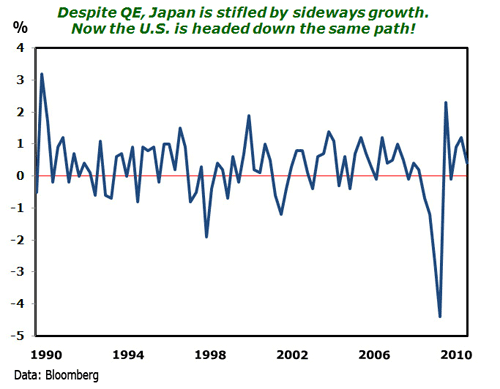If the Recession Has Ended, Why Is the Fed So Worried?
Economics / Double Dip Recession Sep 29, 2010 - 07:26 AM GMTBy: Claus_Vogt
 The National Bureau of Economic Research (NBER) is the official arbiter of U.S. economic history. It sets the officially accepted dates for the beginning and the end of U.S. recessions. And on September 20, its Business Cycle Dating Committee published an important statement …
The National Bureau of Economic Research (NBER) is the official arbiter of U.S. economic history. It sets the officially accepted dates for the beginning and the end of U.S. recessions. And on September 20, its Business Cycle Dating Committee published an important statement …
It finally declared the end of the recession that began in December 2007. Here is an excerpt from what it had to say:
“The committee determined that a trough in business activity occurred in the U.S. economy in June 2009. The trough marks the end of the recession that began in December 2007 and the beginning of an expansion.
“The recession lasted 18 months, which makes it the longest of any recession since World War II. Previously the longest postwar recessions were those of 1973-75 and 1981-82, both of which lasted 16 months.”
Does this mean everything is okay now? That the economy is expanding and the world is headed to prosperity?
Of course not. The NBER is not in the forecasting business. Its job is to monitor economic events. In fact, its members felt it necessary to clarify this point by adding the following lines to their recent statement:
“In determining that a trough occurred in June 2009, the committee did not conclude that economic conditions since that month have been favorable or that the economy has returned to operating at normal capacity.”
So there you have it … the Committee does not want to be misinterpreted as economic optimists. And I think they’re very wise to make that point at this stage of the current economic cycle, because …
Once Again, the Fed Seems Worried
|
The bleak economic picture and the dire message of leading economic indicators have obviously not escaped our central bankers. They have again decreased their growth projections in the most recent FOMC press statement:
“Information received since the Federal Open Market Committee met in August indicates that the pace of recovery in output and employment has slowed in recent months.
“Business spending on equipment and software is rising, though less rapidly than earlier in the year, while investment in nonresidential structures continues to be weak. Employers remain reluctant to add to payrolls. Housing starts are at a depressed level. Bank lending has continued to contract, but at a reduced rate in recent months.”
With the housing market in shambles, bank lending contracting, and consumers being tapped out, there is no base for a sustainable recovery. And now — according to the Fed — even the sole bright spot of the current rebound, capital expenditures, is slowing.
However, Quantitative Easing Round Two is in the offing. So the bulls are again betting on the Fed. The big question is …
Will QE2 Save the Day?
The Fed, in the following statement, has reassured the public it will do everything it can to fight another downturn:
“The Committee will continue to monitor the economic outlook and financial developments and is prepared to provide additional accommodation if needed.”
Well, that’s exactly the reassurance they offered and then implemented in spades in 2007/2008. But it didn’t help. The economy was headed for trouble, and it turned out the mighty Fed was not strong enough to stop the tide.
I can’t see a single reason why it should be any different now. If anything I expect the Fed’s efforts to prove even more ineffective this time around. That’s because interest rates are already close to zero. Consequently, there is no more leeway for additional lowering. All that’s left is quantitative easing.
Maybe Bernanke and Co. should ask the Japanese how they used this blunt tool to try to revive their economy — which led to years of economic stagnation, as shown in the chart below, and deflation. But I doubt they’ll bother …
|
After all before QE1 the Fed didn’t consider Japan’s intervention experience with stock market and real estate bubbles. Instead, they insisted there was no bubble in the U.S.
Then when the bubble did burst, they used the exact policy as the Japanese did to fight the aftermath. And just like Japan, the Fed’s efforts failed.
Now by continuing to ignore Japan’s “lost decade” it looks like the Fed is about to do the same thing once again. And if they follow through on their promise, the weak U.S. economy could easily be headed for a further slowdown that amplifies the problems that already exist.
Best wishes,
Claus
This investment news is brought to you by Money and Markets. Money and Markets is a free daily investment newsletter from Martin D. Weiss and Weiss Research analysts offering the latest investing news and financial insights for the stock market, including tips and advice on investing in gold, energy and oil. Dr. Weiss is a leader in the fields of investing, interest rates, financial safety and economic forecasting. To view archives or subscribe, visit http://www.moneyandmarkets.com.
© 2005-2022 http://www.MarketOracle.co.uk - The Market Oracle is a FREE Daily Financial Markets Analysis & Forecasting online publication.





